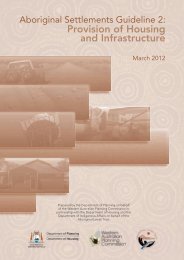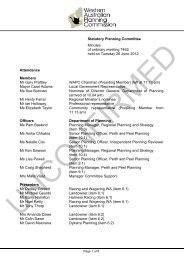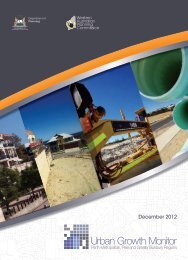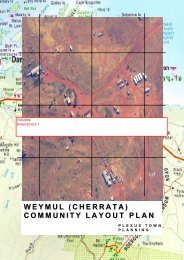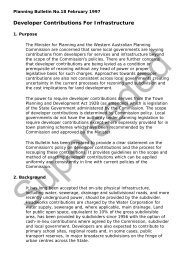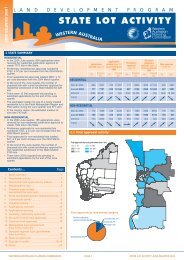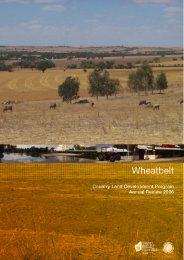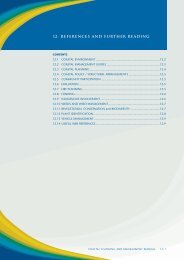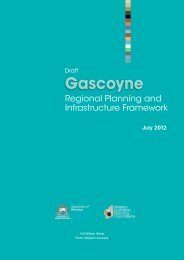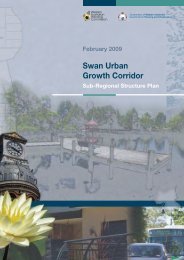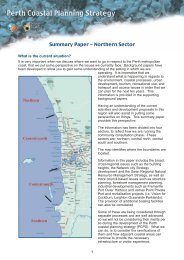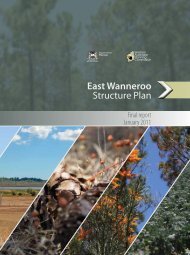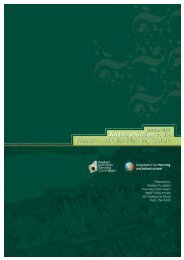Building a Better Planning System - Western Australian Planning ...
Building a Better Planning System - Western Australian Planning ...
Building a Better Planning System - Western Australian Planning ...
Create successful ePaper yourself
Turn your PDF publications into a flip-book with our unique Google optimized e-Paper software.
1.2 Simplify approvals for multi–unit<br />
housing<br />
Streamlining of development approvals for multi–<br />
unit development is proposed via the preparation of<br />
a Multi–Unit Housing Code. The Code is intended<br />
to provide a clearer framework for medium and<br />
high density project design and assessment.<br />
Preparation of the Code is funded and underway,<br />
managed by DPI. The Code should provide both a<br />
‘fast–track’ deemed to comply approval path and a<br />
performance based approval path.<br />
1.3 Provide greater clarity regarding<br />
subdivision engineering conditions<br />
Engineering requirements for subdivision<br />
development are especially problematic as current<br />
WAPC model conditions are generic. In practice,<br />
a wide range of standards and specifications are<br />
applied, with varying levels of consistency across<br />
local government. The Institute of Public Works<br />
Engineering (WA Division) Subdivision Guidelines<br />
are currently being reviewed, with DPI funding<br />
in association with the <strong>Western</strong> <strong>Australian</strong> Local<br />
Government Association and other industry<br />
stakeholders. The new guidelines will provide<br />
minimum engineering standards to ensure a greater<br />
level of consistency across local government (see<br />
Section 1.5).<br />
1.4 Monitor and enforce referrals and<br />
response times<br />
The <strong>Planning</strong> and Development Act 2005 specifies<br />
that State and local government referral advice<br />
on a subdivision is to be received within 42 days.<br />
Average metropolitan local government response<br />
times varied from 32 to 282 days over the 12 month<br />
period to November 2008. Response timeframes<br />
are currently monitored but not reported, and<br />
consideration is being given to DPI providing<br />
regular reporting on performance to relevant<br />
agencies and local governments, with the objective<br />
of receiving over 80 per cent of responses within<br />
42 days. Lagging metropolitan and regional local<br />
governments have been contacted, seeking their<br />
cooperation in improving response times.<br />
To reduce the number of non–essential conditions,<br />
more rigour is required in the number of<br />
applications that are referred to State government<br />
agencies, the matters on which advice is provided,<br />
the usefulness of their responses and the response<br />
times.<br />
Memoranda of Understanding with the Department<br />
of Environment and Conservation and the<br />
Department of Water need to be reviewed to ensure<br />
a more risk–based approach is adopted by these<br />
key agencies. Specific resourcing is also required<br />
to service planning and land use approvals if<br />
performance improvements are to be delivered.<br />
Some agencies such as the Department of Health,<br />
which receive limited referrals, have limited staff<br />
capacity to provide planning referral advice.<br />
1.5 Reduce and simplify model<br />
subdivision conditions<br />
Model subdivision conditions are overdue for<br />
review, with the objectives of reducing the number<br />
of conditions imposed on approvals, standardising<br />
and simplifying conditions to core issues, ensuring<br />
conditions are specific, so that proponents<br />
have clarity of requirements and avoid condition<br />
duplication. There needs to be some scope for<br />
individual local government conditions to reflect<br />
local situations. A DPI review of model conditions<br />
will commence in April 2009.<br />
DPI will need to continue to monitor and audit<br />
condition requests from referral agencies to ensure<br />
consistency with SAT – established criteria for<br />
setting conditions. Regular training of State and<br />
local government approvals officers is also to be<br />
considered.<br />
1.6 Delegate most built strata subdivision<br />
applications to local government<br />
It is proposed that most built strata subdivisions<br />
be delegated by the WAPC to local government,<br />
except where there are matters of regional<br />
significance (such as reservations), or matters<br />
impacting on Crown land and other specific<br />
exemptions where WAPC input is warranted.<br />
Delegation to local government, underway via<br />
existing legislation (section 16 of the <strong>Planning</strong><br />
and Development Act 2005), will include reporting<br />
requirements to enable monitoring of the<br />
applications no longer considered by the WAPC.<br />
<strong>Building</strong> a <strong>Better</strong> <strong>Planning</strong> <strong>System</strong> | Consultation Paper 12



